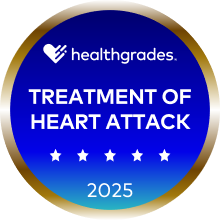Heart Surgery FAQs

At the University of Maryland St. Joseph Medical Center, our cardiac surgery team is committed to preparing you for your surgical journey, from your decision to choose us for your care to your recovery and return to an active, healthy life.
We're here to support you and answer your questions so you can make the most informed decisions. Some of the most common questions we hear from our patients, along with the answers you need to know, are as follows:
How do I know the time is right to have cardiac surgery?
Our team understands the decision to move forward with heart surgery of any kind is a personal and monumental one. You can feel confident that you'll be in the experienced hands of our dedicated cardiac professionals who will help guide these decisions, educate you on the pros and cons associated with the procedure they are recommending, and answer your questions. If you have been diagnosed with a condition that requires surgical care, our team will work with you to develop a comprehensive heart care plan, accounting for your goals and designed to optimize your outcomes and quality of life.
Who is part of my cardiac care team?
Along your surgical journey, you will meet with multiple members of our care team which may include your heart surgeon, a nurse/nurse practitioner/physician assistant, a cardiac anesthesiologist, a radiologist, a respiratory therapist, physical therapist, case manager and a discharge planner.
What educational and support resources are available to help me along the way?
Your heart care team will provide a variety of informational resources to help you during your recovery process following heart surgery. These resources may include:
- Information on a heart-healthy diet including recipes, dietary tips and a recommended shopping list of preferred foods and substitutes.
- A comprehensive guide to exercise and early mobility following heart surgery including detailed exercise instruction and tips for performing activities of daily living.
- Information about support groups. Heart surgery is stressful. Talking to other individuals in the same boat can be helpful. In-person and virtual support groups are available through the American Heart Association and Mended Hearts.
- Free services to help you quit smoking, if necessary.
What can I expect the day of my heart surgery?
You can find more information about preparing before your surgery, the day of surgery, and what the recovery process will be at Preparing for Heart Surgery.
What can I expect in terms of outcomes and quality of life, long-term?
The long-term prognosis for our heart surgery patients is excellent. In fact, our survival rate for coronary bypass surgery, charted over the last several years is 99.7 percent, one of the best rates in the region. We offer patients a wide variety of tools such as access to a cardiac rehabilitation program, physical therapy and nutrition experts – all contributing to our outstanding patient outcomes.

